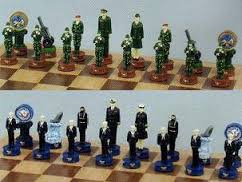
I retired form the United States Navy many years ago. The men and women I served with who impacted my career started with the great nurses I first served with (1977-1980) at the Naval Aerospace and Regional Medical Center (NARMC) as an Emergency Medical Specialist and ended with the Occupational Safety and Health team at the US Naval, Yokosuka, Japan (1992-1996) as a Preventive Medicine Specialist.
The songs below are a reason to remember what we are here to do in order to remember what we have and what we could loose when we don’t lift up our collective voices or allow others to fill the void we leave by in action:
- God Bless the USA by Lee Greenwood
- Sound of Silence by Disturbed (Remake of original by Simon and Garfunkel)
- I’m Already Their by LoneStar
This blog post has little to do with chess, except to remind us that every move we make has consequences either individually or as a nation. Chess as Benjamin Franklin wrote about in his 1786 work The Morals of Chess stated that:
The Games of Chess is not merely an idle amusement;
several very valuable qualities of the mind, useful in the course of human life, are to be acquired and strengthened by it,
so as to become habits ready on all occasions.
He goes on to say that:
By playing at chess, then, we may learn:
1. Foresight, which looks a little into futurity, and considers the consequences that may attend an action: for it is continually occurring to the player, “If I move this piece, what will be the advantages of my new situation? What use can my adversary make of it to annoy me? What other moves can I make to support it, and to defend myself from his attacks?”
2. Circumspection, which surveys the whole chess-board, or scene of action, the relations of the several pieces and situations, the dangers they are respectively exposed to, the several possibilities of their aiding each other; the probabilities that the adversary may make this or that move, and attack this or the other piece; and what different means can be used to avoid his stroke, or turn its consequences against him.
3. Caution, not to make our moves too hastily. This habit is best acquired by observing strictly the laws of the game, such as, if you touch a piece, you must move it somewhere; if you set it down, you must let it stand. And it is therefore best that these rules should be observed, as the game thereby becomes more the image of human life, ….
Finally, Franklin stated (paraphrased here) that playing chess teaches us to preserver and not give up, even in the face of great odds. For it was the famous French Chemist & Developer of the Germ Theory of Disease Louis Pasteur who said Dans les champs de l’observation le hasard ne favorise que les esprits préparés. Translation – In the fields of observation chance favors only the prepared mind. More simply put by the the 2nd World Champion of Chess, Emanuel Lasker, If you see a good move, look a little longer for a better move. This capacity to preserver to look deeper and longer to find solutions are what our veterans and all of us are called to do every day in order to leave the world or a chess game – a little better than we found it.
Can we all work together to leave our world and each other than they were found?
After all, each piece on a chess board is part of a team and when piece is removed and not properly used to it’s fullest capacity it and the over position on the board is weaker. Each side can be seen as a family from pawn to Queen and rook to King. Chess allows us to learn how to use the strengths of each piece to their best possible capacity, and use other pieces to fill in an strengthen to the inherent weaknesses those pieces cannot cover on their own!